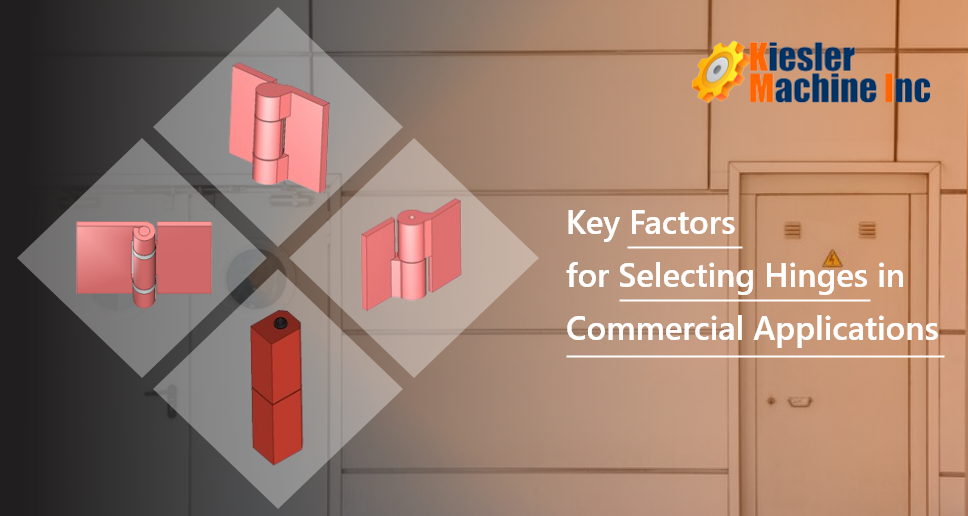Factor Considerations When Selecting Hinges for Commercial Applications
Hinges have been integral part of doors, windows, industrial equipment and several applications that require movement at angles along with structural stability. They are a commonly used hardware in commercial and industrial facilities, serving as essential connectors that allow controlled movement of doors, gates, and other fixtures. Their ability to facilitate smooth and precise motion immensely contributes to the accessibility and operational efficiency of spaces. Today, hinges are available in different types and specifications, and one can opt for custom hinges too. Thus, it can be challenging to choose the right type for your application. Several factors need to be considered before making any decision. Security and longevity are two of them. Are you intrigued to know more about hinges and their types? How to choose the right hinges for industrial applications? This post answers these questions in detail. So, stay connected.
Discussing Selection Guide for Industrial Hinges
The uses of hinges are vast. Thus, their selection demands attention to detail and several factor considerations to ensure optimal functionality and durability. Here are some critical pointers that will ease the process.
-
Type of Hinge:
Hinges are available in different types to cater to specific applications. Considering your application requirements, you can select the appropriate one. Here are some typical types of hinges found across industrial and commercial applications.
- Butt Hinges: These are the most popular and widely used door hinges They feature dual pivoting plates with interlocking fingers that form a barrel shape. One plate is attached to the door, and the other to the jamb. They are ideal for indoor applications.
- Vault Hinges: They are ideal for heavy-duty partition doors. Non-handed for either left-hand or right-hand mounting. Available in weld-on or bolt-on mounting.
- Door Hinges: These hinges are preferred for large and heavy doors. Carbon steel and stainless steel are two materials used for manufacturing these large door hinges. They have gained immense traction owing to their reliability and longevity. Door hinges find applications in medical, military, and R&D facilities.
- Pivot Hinges: They are mainly preferred for applications experiencing high traffic. They are designed using a thrust bearing and needle bearing. Thus, they carry heavy loads for years. They are used mainly in food processing, medical centers, nuclear research, and marine environments.
- Weld-on Hinges: These hinges do not require a hole or drill in the door or gate. As their name implies, they can be welded or mounted to the surface. They are designed for shipping containers, vault doors, prison doors, and gates.
- Radiation Shielding Hinges: These hinges are constructed using high-quality materials offering years of trouble-free services. These hinges are fabricated in left and right hand as well as non-handed configurations and can be supplied with or without mounting holes. Lead-filled radiation doors and heavy architectural gates are typical application areas of these hinges.
- Material and Finish: This is another important consideration when selecting hinges for your application. Keeping the installation area and working environment in mind, select the materials and finishes of the hinges. Stainless steel and carbon steel are standard material options, while finishes like electroless nickel, zinc or hot dipped galvanized can enhance the visual appeal and corrosion resistance.
- Load Capacity: Before selecting any hinge, evaluate the size and weight of the door or gate. The hinge chosen should d not exceed the maximum door weight or radial load.
- Installation Method: It is important to consider the installation constraints and requirements before making any firm decision. Depending on the application and design preferences, some hinges may be surface-mounted, full mortise, or half mortise style.
- Environmental Factors: Evaluate the environmental conditions, including temperature variations, exposure to moisture, and potential corrosive elements. Select the hinges with adequate resistance to ensure long operational life in the concerned settings.
- Frequency of Use: Check how often the door will be in motion. Areas with heavy traffic may require heavy-duty hinges to prevent premature wear and tear.
- Security Needs: For most mission-critical applications, security is a top priority. Thus, choose hinges with tamper-resistant designs or security pins. This will enhance protection against unauthorized access.
- Regulatory Compliance: Hinges should comply with industry standards and regulations. It is extremely important for commercial facilities and public buildings where safety codes must be adhered to.
By now, you may have got some idea of hinges, their types, and selection criteria. There are endless options to choose from if your application demands them. If you plan to purchase any of these hinges, you must source them from a reliable, trustworthy manufacturer or supplier. Kiesler Machine offer some of the best hinges in UK. The company offers custom hinges catering to your application requirements. The experts at the company will assist you throughout the selection process and also solve queries if you have any.



